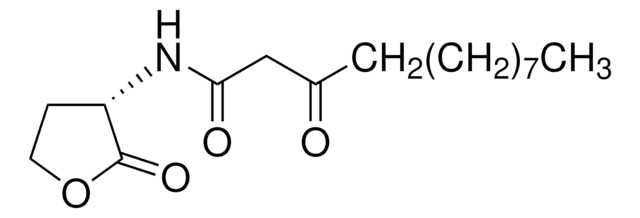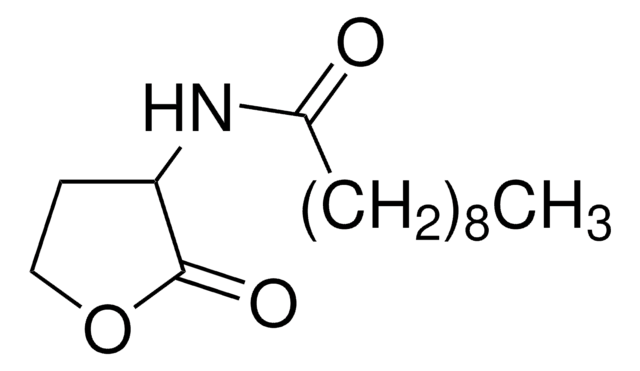53796
(Z-)-4-Bromo-5-(bromomethylene)-2(5H)-furanone
≥97.0% (GC)
Synonym(s):
Furanone C-30
Sign Into View Organizational & Contract Pricing
All Photos(1)
About This Item
Empirical Formula (Hill Notation):
C5H2Br2O2
CAS Number:
Molecular Weight:
253.88
Beilstein:
120928
MDL number:
UNSPSC Code:
12352106
PubChem Substance ID:
NACRES:
NA.25
Recommended Products
Quality Level
Assay
≥97.0% (GC)
97.0-103.0% (T)
form
solid
storage temp.
−20°C
SMILES string
Br\C=C1/OC(=O)C=C1Br
InChI
1S/C5H2Br2O2/c6-2-4-3(7)1-5(8)9-4/h1-2H/b4-2-
InChI key
DPGLBHQUHFJRJS-RQOWECAXSA-N
Biochem/physiol Actions
The synthetic furanones C30 interfered with the actions of acyl-HSL molecules and inhibited gene expression regulated by quorum-sensing systems in P. aeruginosa.
Packaging
Bottomless glass bottle. Contents are inside inserted fused cone.
Storage Class Code
11 - Combustible Solids
WGK
WGK 3
Flash Point(F)
Not applicable
Flash Point(C)
Not applicable
Certificates of Analysis (COA)
Search for Certificates of Analysis (COA) by entering the products Lot/Batch Number. Lot and Batch Numbers can be found on a product’s label following the words ‘Lot’ or ‘Batch’.
Already Own This Product?
Find documentation for the products that you have recently purchased in the Document Library.
Customers Also Viewed
Young Mok Heo et al.
Marine drugs, 16(12) (2018-12-19)
In our previous study, all Arthrinium isolates from Sargassum sp. showed high bioactivities, but studies on marine Arthrinium spp. are insufficient. In this study, a phylogenetic analysis of 28 Arthrinium isolates from seaweeds and egg masses of Arctoscopus japonicus was
J Fernando Montes García et al.
Antonie van Leeuwenhoek, 113(9), 1371-1383 (2020-07-17)
Actinobacillus seminis is an autochthonous gram-negative bacterium that affects reproductive organs, causing epididymitis, low fertility, and occasional abortions in ovine and goats. The virulence factors and the pathogenicity mechanisms of A. seminis have not been clearly elucidated yet. In this
B X V Quecan et al.
Frontiers in microbiology, 10, 867-867 (2019-05-21)
Quorum sensing (QS) regulates bacterial gene expression and studies suggest quercetin, a flavonol found in onion, as a QS inhibitor. There are no studies showing the anti-QS activity of plants containing quercetin in its native glycosylated forms. This study aimed
Kulwadee Karnjana et al.
Fish & shellfish immunology, 88, 91-101 (2019-03-01)
Bacteria respond to host immunity for their proliferation and survival by cell-cell communications such as biofilm formation, bioluminescence, and secreting virulence factors. In the biofilm form, bacteria are more resistant to various antimicrobial treatments and withstand the host's immune system.
H Wu et al.
The Journal of antimicrobial chemotherapy, 53(6), 1054-1061 (2004-05-01)
Antibiotics are used to treat bacterial infections by killing the bacteria or inhibiting their growth, but resistance to antibiotics can develop readily. The discovery that bacterial quorum-sensing regulates bacterial virulence as well as the formation of biofilms opens up new
Our team of scientists has experience in all areas of research including Life Science, Material Science, Chemical Synthesis, Chromatography, Analytical and many others.
Contact Technical Service













